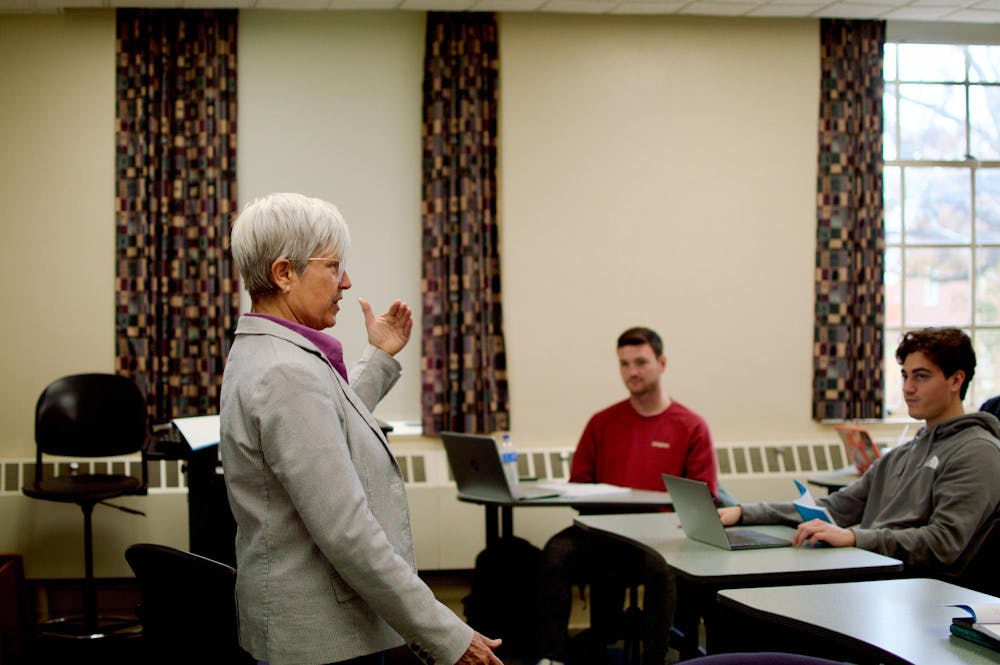“I am Miami,” voices echo around the stadium at the convocation, as first-year students recite the Code of Love and Honor, a pledge designed to instill the values of the university into its pupils.
“I believe that a liberal education is grounded in qualities of character and intellect,” but does Miami University’s administration agree?
Recently, Miami has been pushing to defund and sideline this liberal arts education, even in a time when the threat of artificial intelligence (AI) is making it more important. The university constantly touts its liberal arts education and its status as “public ivy.”
In September, the university published an article about its placement in a new college search guidebook, “Dream School,” by author Jeff Selingo. The book discusses how the “Miami Plan’s core curriculum gives students in all majors the flexibility to take 27 credits across the humanities, the sciences and global perspectives.” Despite this, the administration has continuously pushed to defund and sideline the humanities.
Earlier this year, the university implemented its new budget system. The new system changes how funding for departments is calculated. Now, 40% of instructional revenue will be given to a student's primary major, a large increase from the 25% set aside previously. This means that a department will get far less funding for offering courses to students from other majors, emphasizing ones that mostly offer courses to its own students and punishing ones that participate heavily in the Miami Plan.
In doing so, the university incentivises the destruction of the very liberal arts program it holds so closely to its identity.
This is only the most recent effort from the university to defund the humanities. In 2023, the university pushed to eliminate or consolidate humanities majors they saw as having “low enrollment,” a move which was met with backlash from students and faculty. Furthermore, the Division of University Advancement, which facilitates fundraising for the university, has clearly been sidelining the humanities.
Its current campaign, which hopes to bring in $1 billion for the university, has four cornerstones for the future, which include scholarships, business and entrepreneurship, clinical health sciences and digital innovation and technology. These cornerstones sound far closer to those of a polytechnic institution than a liberal arts university.
This trend isn’t unique to Miami. Similar changes have been implemented at other institutions around the country. The University of Tulsa, for example, also blamed economic reasons when it attempted to defund its own liberal education programs in 2019, a move that went so poorly it led to massive student backlash and a vote of no confidence in the president and provost.
While the university hasn’t said exactly why they are implementing these changes, it stands to reason that it, like many other universities, is following the trend of the growing economic importance of the tech sector, which is now responsible for over 50% of the S&P 500's total return, according to the New York Times.
But a high market share is not always correlated with a high number of jobs in the sector, and even as the number of graduates with computer science degrees continues to grow, the number of jobs has vastly shrunk. According to TechCrunch, just last year, 150,000 people were laid off in the tech industry, in large part due to the threat of AI on computer science jobs.
If Miami wants to capitalize on the computer science trend, it is 20 years too late. The threat of AI has had an apparent dampening on enrollment in computer science degrees, which had quadrupled between 2005 and 2023 but is now starting to slow. The Atlantic reported that this year, enrollment only grew by 0.2%. Jobs in creative and academic industries are inherently safer from the threat of AI, making them more attractive for students entering higher education.
Enjoy what you're reading?
Signup for our newsletter
Even for jobs in the tech sector, it's clear that technical skills alone will not set students apart in the job market. Students increasingly need to develop soft skills and focus on the human things that AI can’t do. In other words, students need to focus on the aptly named humanities.
Miami continues to advertise one kind of education to students while displaying another when fundraising and building the budget. Searching for over one billion dollars to transform the university into a completely different kind of institution. As one university senator said at the annual budget symposium this summer, “I understand you need to stay aware of national trends, but if we only inform Miami’s future to follow what others are doing, we’re going to lose what makes it special.”
If the administration continues down this path, humanities faculty and students may find themselves pushed further onto the sidelines in increasingly compressed and defunded majors while STEM majors graduate into oversaturated job markets without any humanities-based skills to help them stand out.
Abe Hagood is a first-year student double-majoring in Emerging Technology in Business and Design and Creative Writing. He is a member of the Miami Game Design Club and Miami YDSA.




